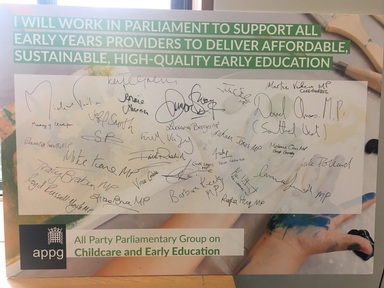'Capacity crisis': 30-hour free childcare scheme faces shortage of places
Tens of thousands of parents could miss out on the 30-hour funded childcare entitlement as the Government underestimates the take-up of the offer by more than 100,000 places, according to new research.

Early years organisation Pre-school Learning Alliance has warned that the Government is heading for a “childcare capacity crisis” after an independent report claimed as many as 500,000 parents could be eligible for the scheme, rather than the estimated 390,000.
Neil Leitch, chief executive of the Pre-school Learning Alliance, called the figures "deeply concerning" and said: "The Department for Education (DfE) has been clear that the whole point of restricting the scheme to ‘working families’ is to encourage parents to go back to work, yet they don’t seem to have factored even the most modest of adjustments into their figures, such as parents working a few more hours to become eligible.
"Add to this the fact that many providers are warning that they are planning to either limit the number of 30-hour places they offer, or opt out of the scheme all together, and it’s clear that the Government is heading for a childcare capacity crisis."
He urged the Government to do more to support early years providers if the 30-hour scheme is to have any chance of working in the long-term.
"30-hours of so-called ‘free childcare’ may sound like a great policy, but if there aren’t enough places to match demand, and the Government continues to refuse to listen to valid concerns over funding, the policy simply cannot succeed," warned Mr Leitch.
Eligibility
The Government has estimated that 390,000 three- and four-year-olds will be eligible for the 30-hour offer, which is restricted to children from ‘working families’ meeting certain earnings thresholds.
However, independent research commissioned by the Pre-school Learning Alliance and undertaken by research company Ceeda, based on a survey of 1708 households, suggests that the number of children currently meeting the eligibility criteria is 478,000 – 23 per cent higher than the Government’s estimate.
The findings further suggest that current estimates do not take into account the impact of parents in working households making relatively small changes to their work patterns to become eligible for the scheme, such as increasing their hours.
According to Ceeda, such changes could account for a further 22,000 children becoming eligible for the offer, bringing total eligibility to around 500,000 – 28 per cent higher than the Government's estimate.
Investment
A Department for Education spokesman said the Government would be spending a record £6bn on childcare by 2020, including an additional £1bn on the free hours.
"We are investing more in childcare than any previous Government, spending a record £6bn per year by 2020 – this includes an additional £1bn per year on our free entitlements to support families with the cost of childcare.
"Around 390,000 working families will be eligible for 30-hours free childcare from September. In most cases, their children are already in existing childcare places, which will become free. We are also creating almost 9,000 new places through £50m of capital grants."
Research
Jo Verrill, managing director of Ceeda, commented: "Settings have very little information available to them regarding the nature and volume of demand for a 30-hour offer in their area as they plan provision for September.
"This research sheds light on parents' preferred childcare choices and anticipated patterns of use at national level, to give some pointers on what may be ahead. It will be important for local authorities to build on this picture at a local level.
"The final and critical stage of this research is to get providers views on their capacity to offer funded places in light of this new information and the recent announcements on funding rates. We will be contacting a random sample of private, voluntary and independent settings across the country to get their views; if your setting is selected for the study please do take part, results will be summarised and shared to help the sector prepare for the roll-out of the 30-hours in September 2017."
For more information on the report, go to: www.ceeda.co.uk
Latest News Analysis
 06-Aug-19
Nursery boss says 'cultural capital has always been important, it shouldn't be new'
06-Aug-19
Nursery boss says 'cultural capital has always been important, it shouldn't be new'
 25-Jul-19
Gavin Williamson appointed education minister
25-Jul-19
Gavin Williamson appointed education minister
 17-Jul-19
Flexible Working Bill for all jobs gets MPs approval - delighting parents, disabled and carers
17-Jul-19
Flexible Working Bill for all jobs gets MPs approval - delighting parents, disabled and carers
 03-Jul-19
MPs blame government policies for nursery closures in deprived areas
03-Jul-19
MPs blame government policies for nursery closures in deprived areas
 14-May-19
Number of schools wanting to pilot Reception Baseline Assessments 'embarrassingly low'
14-May-19
Number of schools wanting to pilot Reception Baseline Assessments 'embarrassingly low'